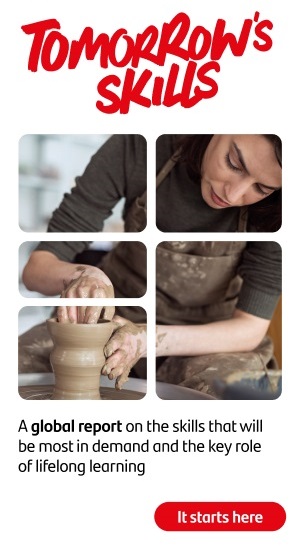Lifelong learning and AI: the key to future employability in Santander’s Tomorrow’s Skills report


Don't miss these key takeways
- Updating skills is a necessity not an option, according to a survey conducted in 15 countries across Europe and the Americas that underscores the need to adapt to a constantly evolving market.
- Six in ten respondents believe that proficiency in AI will be essential to remain employable, while one in three fear their current job could eventually be replaced by it. The research, which benefits from the collaboration of renowned academic experts, concludes that AI will be the largest disruptor in the job market.
- Eight out of ten people feel the need to keep expanding their knowledge.
- 39% of respondents perceive that the public sector's lifelong learning initiatives are insufficient, and over four in ten (43%) believe that companies should be responsible for offering lifelong learning to their employees.
Brussels, 11 June 2025.
The traditional single-time study paradigm is no longer adequate in a world of constant economic, technological, and social change. Santander’s Tomorrow’s Skills report, released today, reveals a new landscape – one where lifelong learning is the cornerstone of professional development. According to the report, eight out of ten people feel the need to keep expanding their knowledge, while 38% believe that the training they received before entering the labour market has not been useful to them.
AI is set to be the biggest disruptor to the job market, with its use becoming essential for employability. Six out of ten respondents share this view and also predict that AI and Data Science will be among the most in-demand fields over the next five years. Expectations of AI disruption are high: one-third of respondents believe that it will replace their job in the future, while seven out of ten agree that future generations will have jobs that are yet to be invented.

The rise of artificial intelligence is not just transforming how we work; it’s reshaping how we live and learn. This shift brings enormous opportunity to enhance productivity, boost competitiveness, and create new value. But it also raises an urgent question: are we ready to adapt to this new reality? At Santander, we believe businesses must be part of the solution. That’s why we’re investing €400 million between 2023 and 2026 to support education, employability and entrepreneurship. With initiatives like Santander Open Academy, we aim to support lifelong learning, helping people upskill, reskill and unlock new opportunities—so no one is left behind.
Ana Botín, Banco Santander Executive Chair
The report, based on a field study of 15,000 people in 15 countries across Europe and the Americas, demonstrates the need to adapt to a constantly evolving market where updating skills is no longer optional. Notably, four out of ten would choose to specialize in a different field.
The vast majority see expanding their skillsets as a necessity, though opinions vary on the adequacy of current adult learning propositions and around who should be responsible for providing training. 39% of those surveyed believe that the public sector's lifelong learning offering is insufficient, and 25% think it is the public sector's responsibility to provide these learning opportunities. 43% of respondents instead believe this responsibility belongs to companies, while another 29% see the responsibility for lifelong learning lying with individuals to update their skills within their profession or change their career path.
Skills market
This report, featuring experts from several international academic institutions, explores emerging opportunities in education, employability and entrepreneurship, and offers a forward-looking perspective on how to prepare for tomorrow’s job markets.
The working environment is shaping up to be a market where continuously developing skillsets will be crucial. Nearly half of the respondents (45%) place greater importance on soft skills such as communication, leadership and teamwork over technical training.
Against this backdrop, digital training platforms continue to emerge as an alternative training option. While the vast majority (89%) are unaware of these tools, which facilitate upskilling and reskilling, six out of ten people nevertheless express a willingness to use them.
36% prefer hybrid learning, and 31% would choose public universities as their provider for continuing education. There is also a widespread belief that entrepreneurship is growing as an alternative for generating employment and wealth.
A geographical perspective
While attitudes vary by region, a global shift toward self-directed, practical learning is emerging.
The geographical dimension is essential to understanding how the skills of the future are shaped in different contexts. This report explores the varying realities and perceptions of education and the skills required in the future based on the respondents’ origin. The data shows that Europe leads in career mobility, with 70% of respondents having changed sectors, companies, or roles during their professional lives.
Europeans also stand out for being the most dissatisfied with the education they received prior to entering the job market, yet at the same time, they display a certain optimism about the future of the continent: 64% believe there are good job opportunities, and only 26% would be willing to emigrate outside the EU for work-related reasons.
The pragmatic nature of North American culture is reflected in this global survey, where 48% believe that practical experience and non-formal education will be more valuable than formal education. Along these lines, continuous training delivered by experienced professionals is the preferred option for half of the respondents. Additionally, Americans are the most likely to place responsibility on companies to provide ongoing training for their employees (52%).
In contrast, Latin America shows the strongest belief that it is the individual’s responsibility to secure the training needed to adapt to an evolving job market. 32% of Latin American respondents report having made no career changes, the highest figure across all regions. Furthermore, it is the region with the most positive perceptions (65%) of the impact of digital learning and professional development platforms, and where people show the greatest willingness to use them (76%).
Santander and its support for education, employability and entrepreneurship
Banco Santander has been a pioneering supporter of education, employability and entrepreneurship for almost 30 years, standing out among the world's financial institutions. Santander has deployed over EUR 2.4 billion to support these areas, providing help to more than 3.7 million people and businesses through partnerships with nearly 1,100 universities (www.santander.com/universidades).
The full report can be viewed here.
Ana Botín, Executive Chair of Banco Santander, and Roberta Metsola, President of the European Parliament, presented Santander’s "Tomorrow’s Skills" report in Brussels today.









